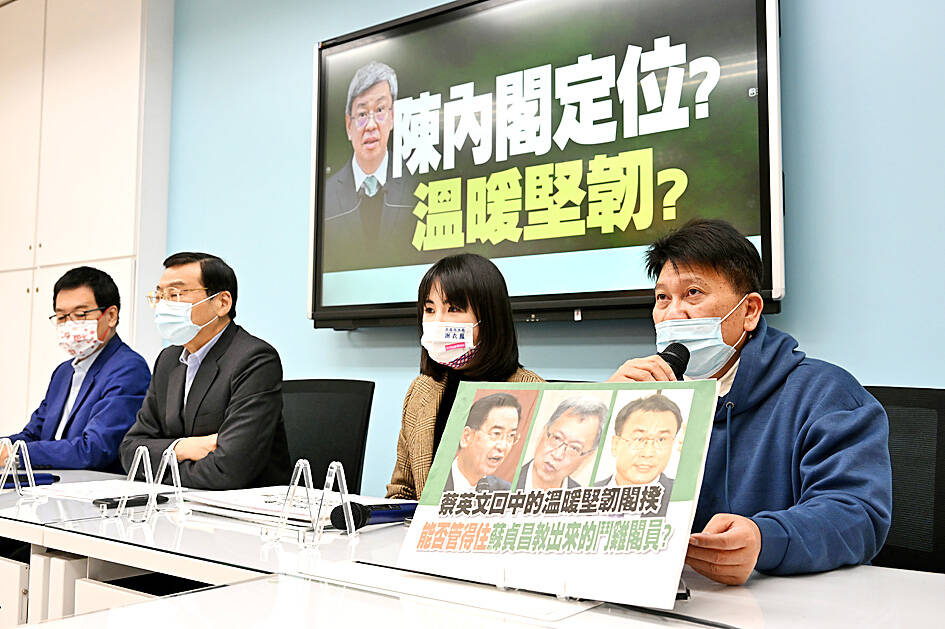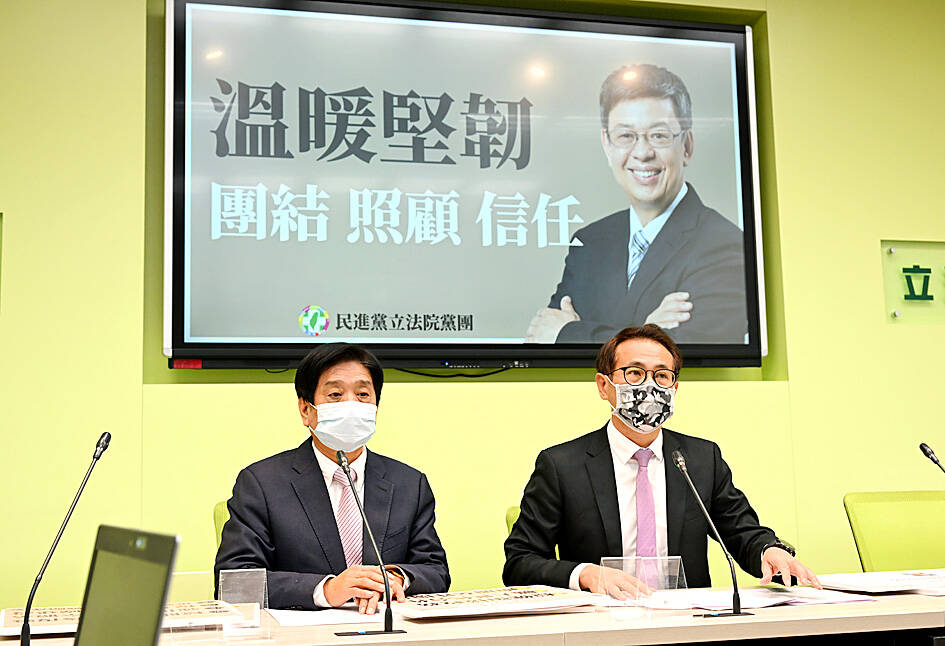The Chinese Nationalist Party (KMT) yesterday said it has very low expectations for the new Cabinet, as it is not significantly different from the previous Cabinet, and “exists to serve only the will of President Tsai Ing-wen (蔡英文).”
“The Cabinet reshuffle is plain and insignificant, and I am sure many people feel the same way,” KMT Chairman Eric Chu (朱立倫) said on the sidelines of the party’s Lunar New Year festive gathering.
“We are facing many challenges in the post-pandemic era, but the officials who have been put in charge of national security, internal politics, and financial and economic affairs are uninspiring,” he said.

Photo: Lin Cheng-kun, Taipei Times
“Instead of guiding the nation in a specific direction of governing, these officials were appointed based on their loyalty to factions of the Democratic Progressive Party [DPP],” Chu said. “We should not have high expectations for the DPP, as they tend to put the party’s will above the people’s interests.”
Chu criticized incoming premier Chen Chien-jen (陳建仁) for accepting administrative leave from his position at Academia Sinica rather than resigning after he accepted Tsai’s appointment.
“It seems that a Cabinet led by Chen would be served by someone who sees himself as a caretaker until the KMT wins the next election,” Chu said.

Photo: Lin Cheng-kun, Taipei Times
Former KMT chairman Johnny Chiang (江啟臣) said the lack of difference between the new and previous Cabinet shows that Tsai has a limited number of people to choose from, and that the DPP has not learned from November’s election losses.
“The DPP lost most of the local elections because it did not listen to the people, yet the new Cabinet was formed to serve Tsai, not to serve the people,” he added.
Former president Ma Ying-jeou (馬英九) of the KMT said people should give the new Cabinet some time before judging how it performs.
“It is not meaningful to quibble on procedures at Academia Sinica,” DPP legislative caucus director Cheng Yun-peng (鄭運鵬) said yesterday in response to the criticisms.
“The opposition is making a fuss over Chen’s leave of absence from research work on a suspended salary during his service,” Cheng said.
The opposition always takes biased stances to criticize DPP members accepting government posts, which is not fair, he said.
“Taiwanese have objective views on Chen’s standing in academia, and on his decision to return to politics,” Cheng said.
“Chen has personal warmth. He is just like the ‘noble knight’ in the historical traditions of the Catholic Church,” he added.

Chinese Nationalist Party (KMT) Chairman Eric Chu (朱立倫), spokeswoman Yang Chih-yu (楊智伃) and Legislator Hsieh Lung-chieh (謝龍介) would be summoned by police for questioning for leading an illegal assembly on Thursday evening last week, Minister of the Interior Liu Shyh-fang (劉世芳) said today. The three KMT officials led an assembly outside the Taipei City Prosecutors’ Office, a restricted area where public assembly is not allowed, protesting the questioning of several KMT staff and searches of KMT headquarters and offices in a recall petition forgery case. Chu, Yang and Hsieh are all suspected of contravening the Assembly and Parade Act (集會遊行法) by holding

PRAISE: Japanese visitor Takashi Kubota said the Taiwanese temple architecture images showcased in the AI Art Gallery were the most impressive displays he saw Taiwan does not have an official pavilion at the World Expo in Osaka, Japan, because of its diplomatic predicament, but the government-backed Tech World pavilion is drawing interest with its unique recreations of works by Taiwanese artists. The pavilion features an artificial intelligence (AI)-based art gallery showcasing works of famous Taiwanese artists from the Japanese colonial period using innovative technologies. Among its main simulated displays are Eastern gouache paintings by Chen Chin (陳進), Lin Yu-shan (林玉山) and Kuo Hsueh-hu (郭雪湖), who were the three young Taiwanese painters selected for the East Asian Painting exhibition in 1927. Gouache is a water-based

Taiwan would welcome the return of Honduras as a diplomatic ally if its next president decides to make such a move, Minister of Foreign Affairs Lin Chia-lung (林佳龍) said yesterday. “Of course, we would welcome Honduras if they want to restore diplomatic ties with Taiwan after their elections,” Lin said at a meeting of the legislature’s Foreign Affairs and National Defense Committee, when asked to comment on statements made by two of the three Honduran presidential candidates during the presidential campaign in the Central American country. Taiwan is paying close attention to the region as a whole in the wake of a

OFF-TARGET: More than 30,000 participants were expected to take part in the Games next month, but only 6,550 foreign and 19,400 Taiwanese athletes have registered Taipei city councilors yesterday blasted the organizers of next month’s World Masters Games over sudden timetable and venue changes, which they said have caused thousands of participants to back out of the international sporting event, among other organizational issues. They also cited visa delays and political interference by China as reasons many foreign athletes are requesting refunds for the event, to be held from May 17 to 30. Jointly organized by the Taipei and New Taipei City governments, the games have been rocked by numerous controversies since preparations began in 2020. Taipei City Councilor Lin Yen-feng (林延鳳) said yesterday that new measures by